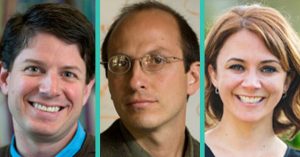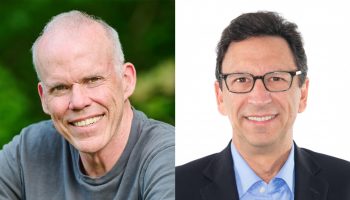A philosopher, a roboticist, and a literary scholar log onto a livestream …

It seems like a silly quarantine-inspired joke, but it isn’t. At 10:45 a.m. EDT Wednesday, July 22, on CHQ Assembly Video Platform, three scholars from Carnegie Mellon University will host an interdisciplinary discussion on the ethics of tech.
Chautauqua Institution will welcome David Danks, Philosophy Department head and L.L. Thurstone Professor of Philosophy and Psychology; Illah Nourbakhsh, K&L Gates Professor of Ethics and Computational Technologies and director of the Community Robotics, Education and Technology Empowerment (CREATE) Lab; and Jennifer Keating, former Assistant Dean for Educational Initiatives at Dietrich College — now a Senior Lecturer and Writing Disciplines Specialist at the Department of English at the University of Pittsburgh.
Danks said that while many universities have scholars who can speak on issues of ethics and tech, CMU is unique in its interdisciplinary approach.
“Carnegie Mellon, as an institution and as a culture, is more interdisciplinary in ways I think run deeper than you find at almost any other university,” Danks said. “It is a culture where we don’t draw divisions of, ‘This is the ethicists’ job, this is the technologists’ job.’ Rather, it is understood that what we’re doing is we’re trying to work collaboratively to produce technology that benefits all. Ethical AI is about the process, not the product. So, it’s absolutely critical you have these kinds of interdisciplinary connections.”
The group will discuss AI in particular, as each member has unique research in that area. Keating and Nourbakhsh wrote the book AI & Humanity, published in March 2020. Along with the book, the two curate a website by the same name that provides teaching points for educators about the increasingly normalized interaction between humans and technology.
The content from the website and book was informed by a multi-year experiment at CMU, where freshman students, from humanities and computer science departments, were put together in seminars on issues of tech’s influence on society.
While working in administration at the university, Keating developed this class among others as an interdisciplinary approach to society’s most “gnarly” challenges.
“It makes sense to start thinking about the ways in which our society has responded to other meaningful advances in technology like the steam engine, the cotton gin, the printing press. Those have had broad societal implications,” Keating said. “What have we learned from researchers in history, anthropology, sociology, political science on attending to those advances in technology and how might you refashion some of those questions to attend to this boundary space that we’re navigating currently?”
This project is Keating’s introduction into the world of tech. Previously, she studied culture and literature from places amid strife — in particular, the Troubles in Northern Ireland. In this research, she began to shift her attention to how advancing technology in the military and police force influenced human-to-human relationships, and shaped the decades-long conflict itself.
“With my own interest in representations of language, veracity and communication, a lot of my considerations on the political effects of language, and people’s relationship to political systems, and how they present that in different fiction or nonfiction forms, really turned into a very rich area of study,” Keating said.
Nourbakhsh provided the roboticist’s point-of-view in this educational experiment, having spent the last decade studying human-robot collaboration and community-based robotics.
“(Through the course) I learned that the humanities students can do extraordinarily deep thinking about technology, and its ramifications,” Nourbakhsh said. “A lot of our technology students are also really equipped to study literature, and to use literature, futuring and science fiction to create an understanding of the kind of imagined possible futures that we face.”
The course was designed to teach students a way of interdisciplinary thinking. Nourbakhsh said that many existing social ills are because of a lack of lateral thinking — causing the movers-and-shakers of the world to be too narrow-minded.
“I think lateral thinking is the only way to solve the complex problems we have in society right now,” Nourbakhsh said. “This is a chance for them to exercise that ability to think laterally, to not just think as a technologist, not just to think as somebody who studies literature and writes science fiction, but to think about how you can use science fiction and rhetoric to advance a narrative to explain to people issues like privacy and surveillance and drone warfare.”
Danks, Keating and Nourbakhsh will replicate this classroom experience in their presentation by utilizing what Nourbakhsh calls “key words” from the field, which can unlock and encourage deeper conversation beyond the presentation.
Keating said that she hopes that with this newfound mindset and vocabulary, the audience will engage in deeper conversations about technology and its impact on society.
“I want the audience to feel empowered,” Keating said. “I would love the audience to interact with us — to ask questions, to bring their expertise to the discussion — to feel like technology is not some advancing tidal wave that is going to overtake their lives, but that these really are just tools.”
After this panel, Danks will present a lecture at 3:30 p.m. EDT on CHQ Assembly on remedying cultural biases in algorithms as a part of the African American Heritage House Lecture Series.
This program is made possible by “The Lincoln Ethics Series” funded by the David and Joan Lincoln Family Fund for Applied Ethics & the McCredie Family Fund.




